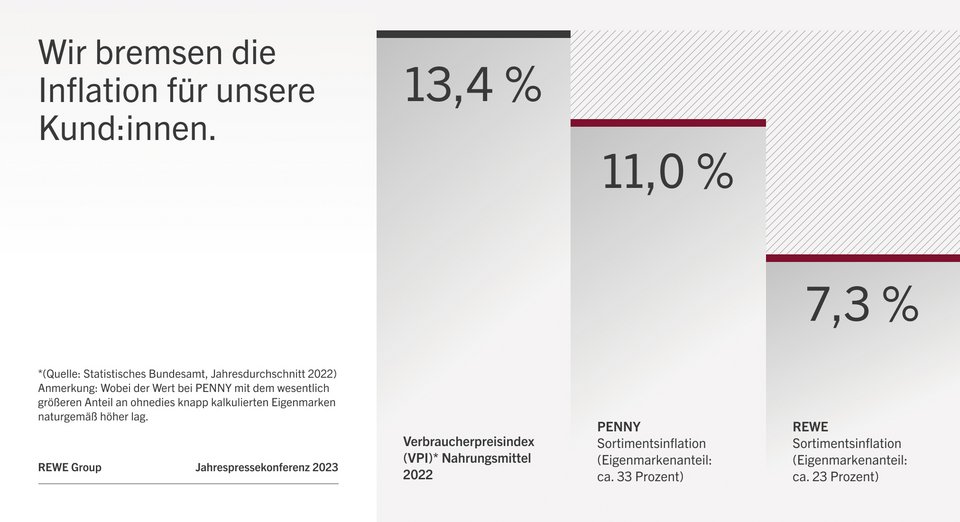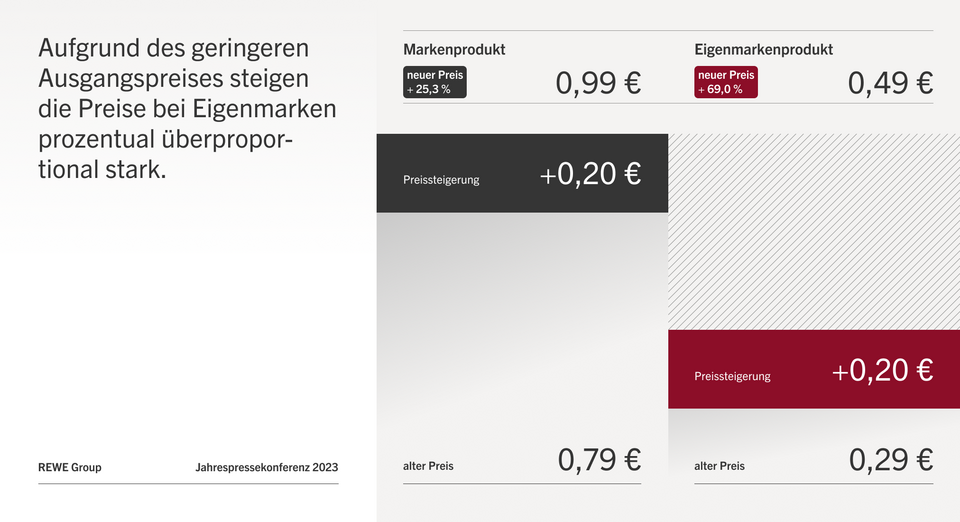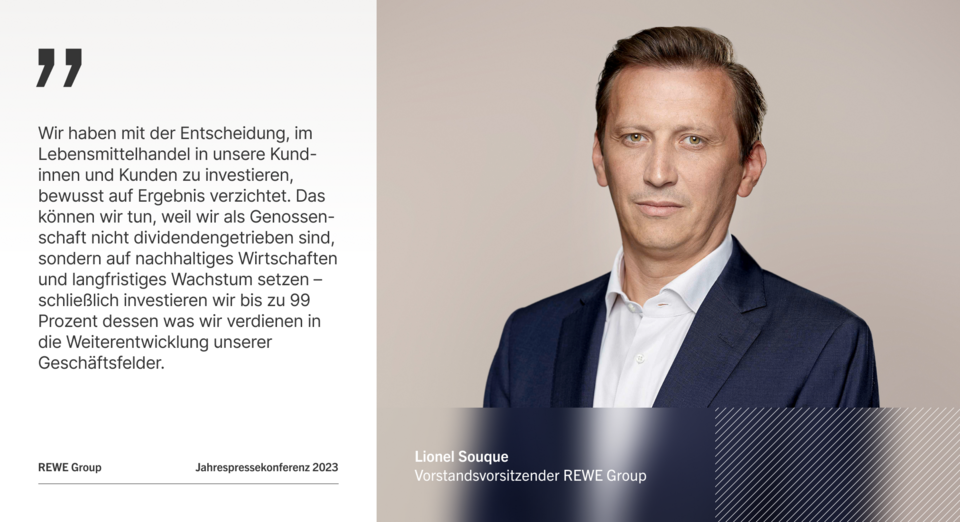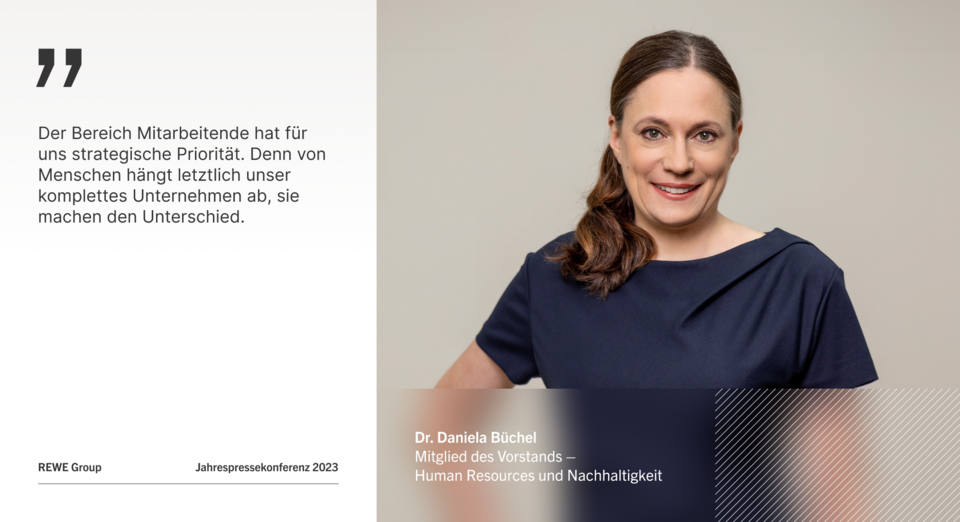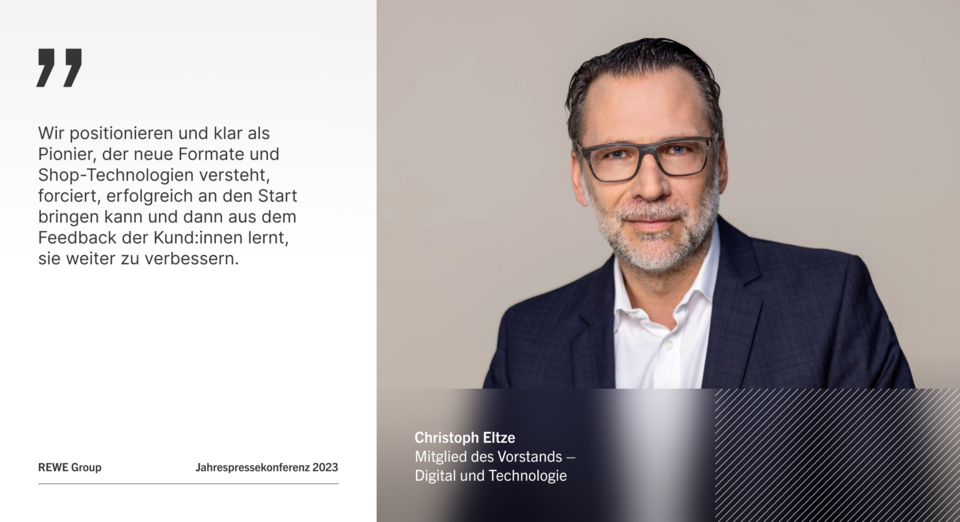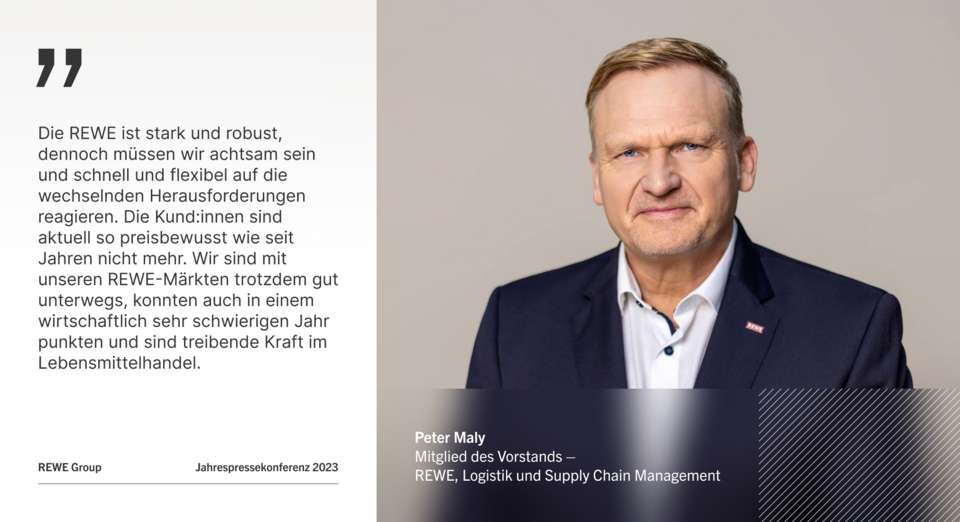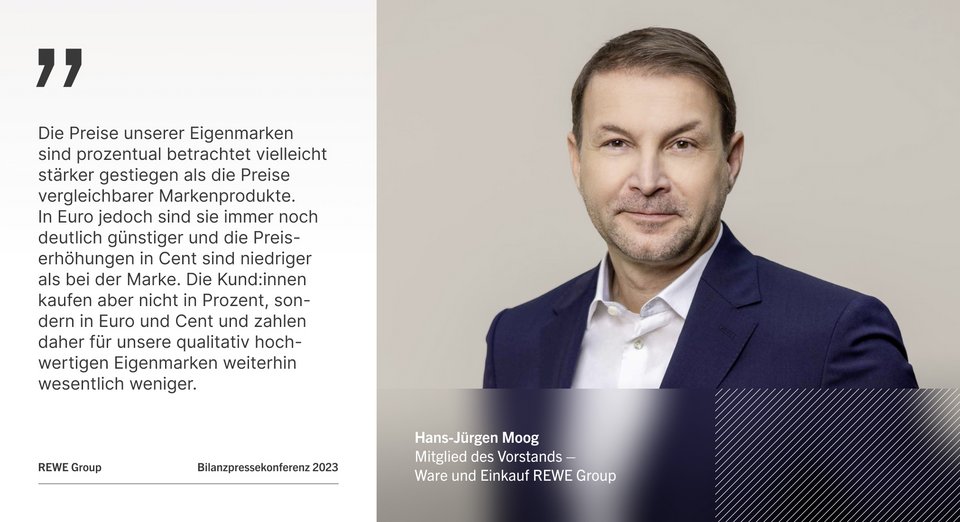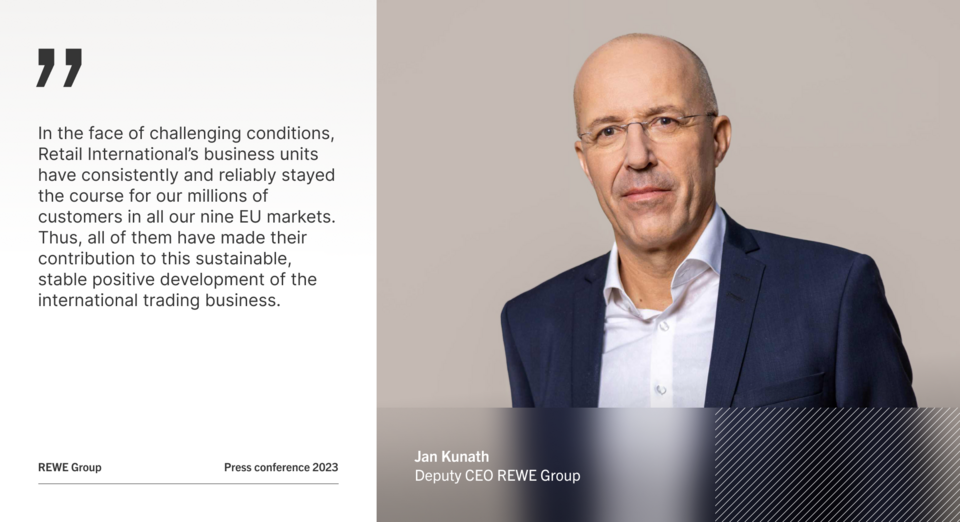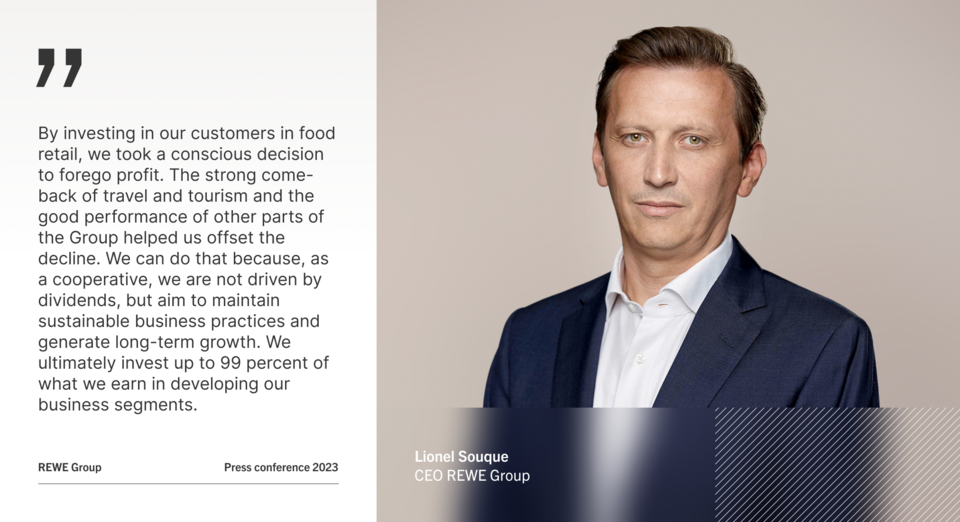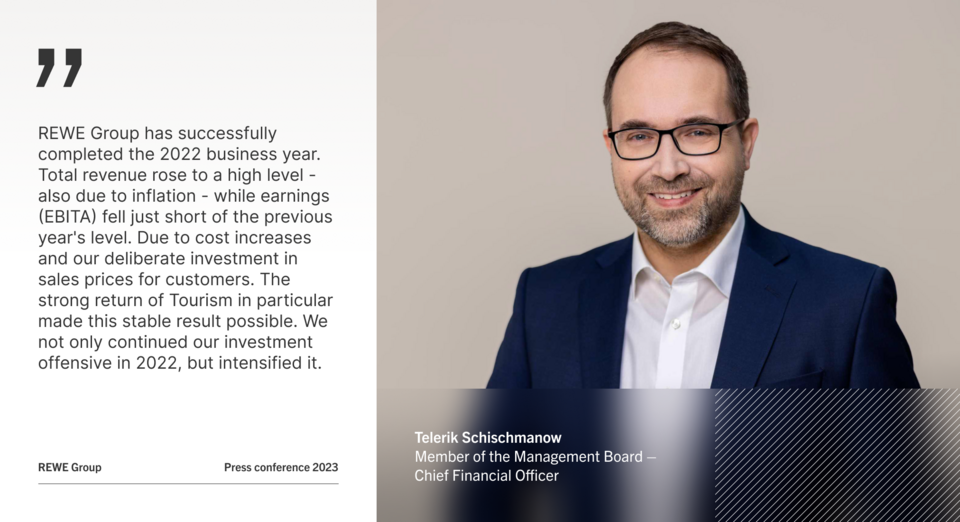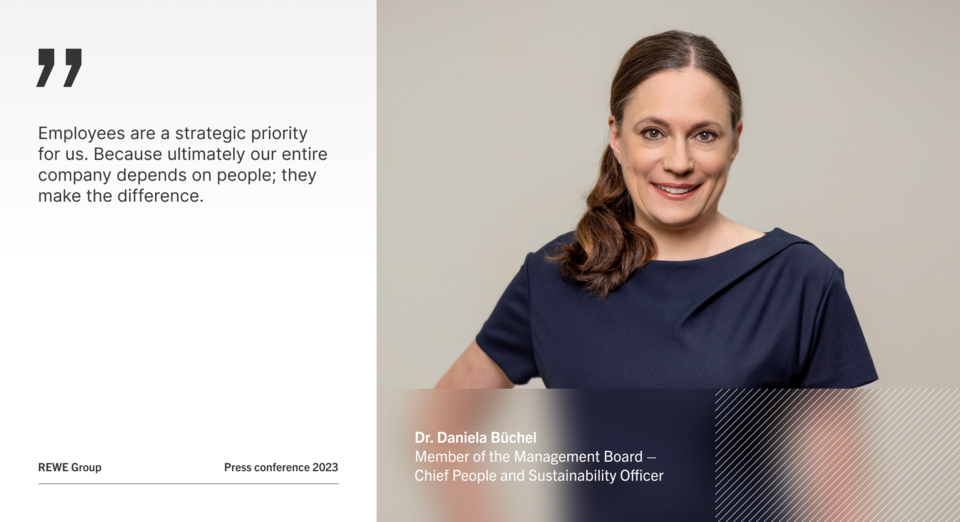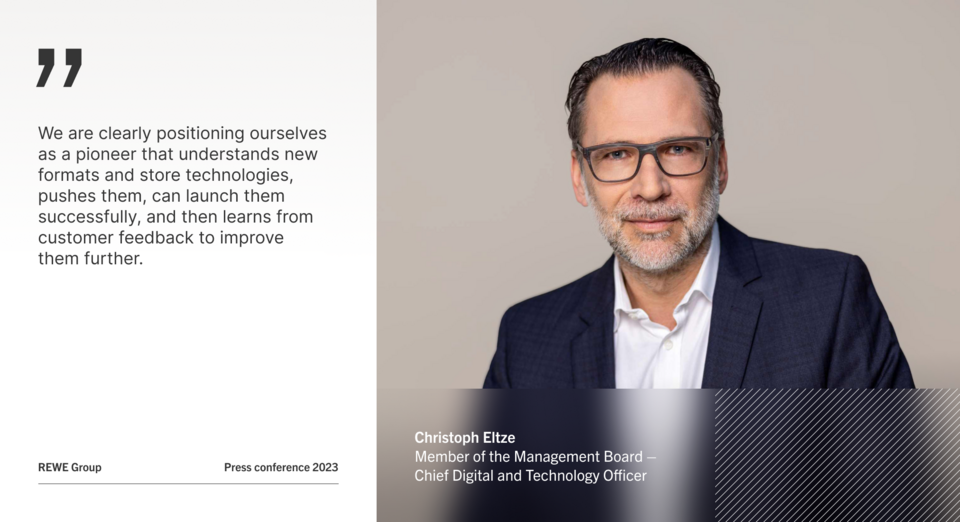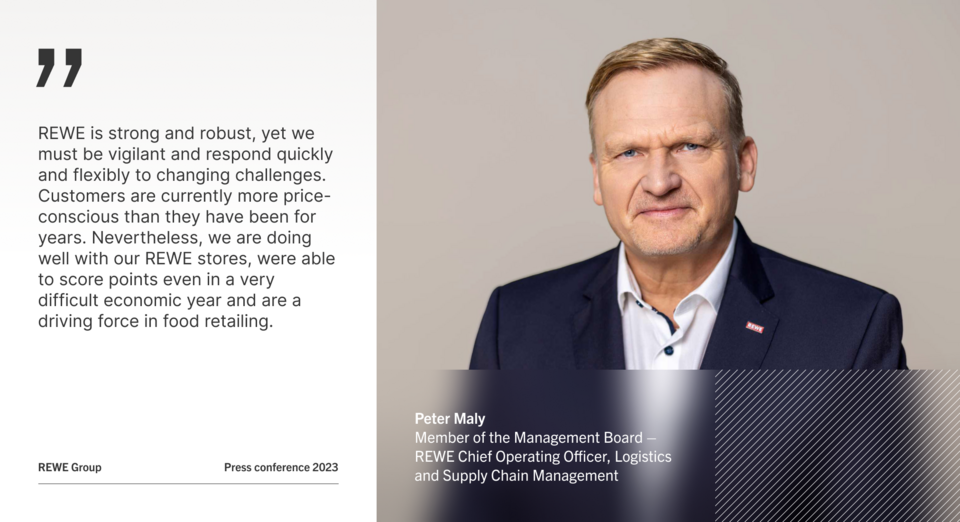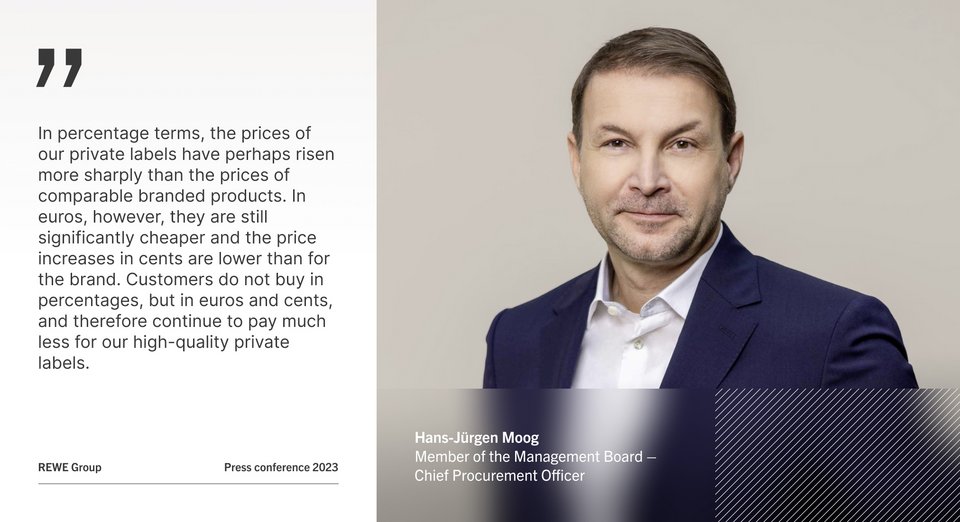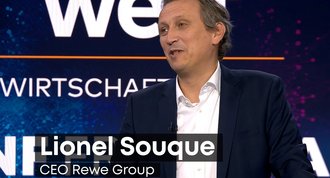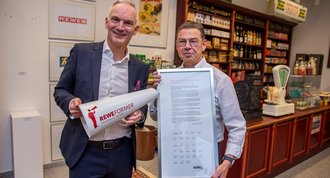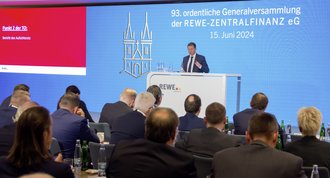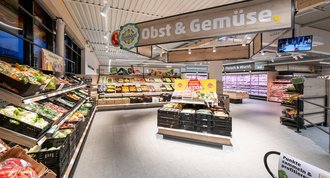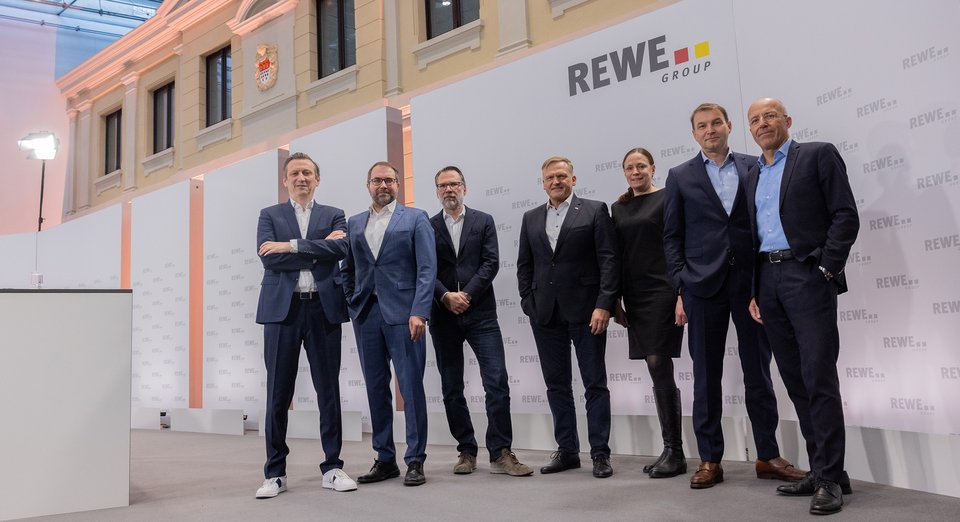
Wir haben das Geschäftsjahr 2022 erfolgreich abgeschlossen und entwickeln uns weiter stabil. Einmal mehr haben sich angesichts der vielfältigen Auswirkungen des Ukraine-Kriegs unser konsequenter Kurs und die breite und solide internationale Aufstellung mit Handel, Touristik und Convenience bewährt.
Der Gesamtumsatz stieg, auch inflationsbedingt, auf ein hohes Niveau, während das Ergebnis (EBITA) knapp unter Vorjahresniveau sank. Die negativen Ergebniseffekte – bewusst kalkulierter Rückgang im Lebensmittelhandel Deutschland durch Investition in Kund:innenpreise, Kostensteigerungen unter anderem aus Energie, Rohstoffen, Personal, Logistik sowie gezielte Risikovorsorge für einzelne Beteiligungen – konnten wir durch die positiven Beiträge anderer Konzern-Bereiche kompensieren. Vor allem die starke Rückkehr der Touristik nach der Corona-Pandemie, aber auch eine gute Entwicklung im internationalen Geschäft und bei Lekkerland haben dieses stabile Ergebnis ermöglicht. Unsere Investitionsoffensive setzten wir 2022 nicht nur fort, sondern verstärkten sie auf sehr hohem Niveau.
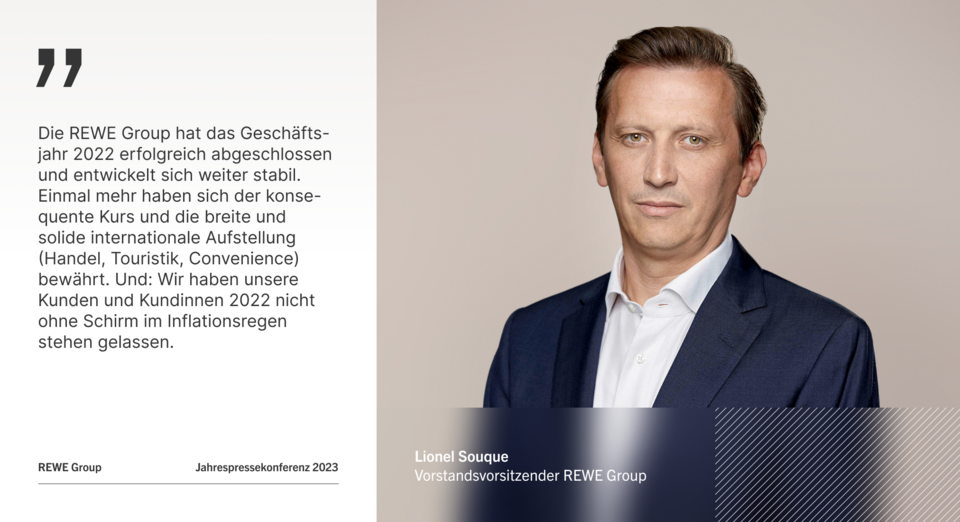
Lebensmittelhandel Deutschland: Dreistelligen Millionenbetrag in Verkaufspreise für Kunden investiert
„Wir haben unsere Kundinnen und Kunden 2022 nicht ohne Schirm im Inflationsregen stehen gelassen“, löste der Vorstandsvorsitzende Lionel Souque sein Versprechen ein. „Alleine in Deutschland haben wir wie angekündigt einen dreistelligen Millionen-Betrag investiert. Damit haben wir unsere Verkaufspreise wirksam und nachweisbar stabilisiert, bewusst einen Ergebnisrückgang im Lebensmittelhandel in Deutschland in Kauf genommen und aktiv auf Gewinn verzichtet.“ Die Sortimentsinflation, also die Preissteigerungen in den Regalen von REWE, konnte so auf das Gesamtjahr 2022 gerechnet mit 7,3 Prozent bei REWE für die Kundinnen und Kunden spürbar unter dem Verbraucherpreisindex, VPI, Nahrungsmittel 2022 von 13,4 Prozent gehalten werden, so Souque.
Genossenschafts-Prinzipien statt Maximierung Shareholder Value
„Wir haben mit der Entscheidung, im Lebensmittelhandel in unsere Kunden zu investieren, bewusst auf Ergebnis verzichtet. Was wir dank der starken Rückkehr der Touristik und der guten Performance weiterer Konzern-Bereiche kompensieren konnten. Das können wir tun, weil wir als Genossenschaft nicht dividendengetrieben sind, sondern auf nachhaltiges Wirtschaften und langfristiges Wachstum setzen – schließlich investieren wir bis zu 99 Prozent dessen was wir verdienen in die Weiterentwicklung unserer Geschäftsfelder“, betonte Souque anlässlich der Veröffentlichung der noch nicht testierten Unternehmenszahlen. Zu dieser langfristigen Ausrichtung zähle beispielsweise auch die langjährige Portfolio-Management-Strategie der REWE Group-Energiegroßhandelstochter EHA, die angesichts der durch die Decke gehenden Energiepreise 2022 in Deutschland die daraus resultierenden Kostensteigerungen um annährend 150 Millionen Euro abgemildert hatte. „Und wir haben unsere Investitionsoffensive in der Krise nicht wie andere runtergefahren oder eingestellt. Sondern ganz im Gegenteil in allen Geschäftsfeldern mit vollem Fokus auf die Kundenwünsche von morgen, Modernisierung, Digitalisierung, Innovation und Ökologisierung, mit einem Gesamtvolumen von 2,8 Milliarden Euro sogar noch verstärkt.“
Solide Finanzkraft sichert erfolgreiche Weiterentwicklung aus eigener Kraft ab
 Insgesamt sind wir auch nach den letzten drei Jahren, die von wirtschaftlichen und gesellschaftspolitischen Extremen geprägt waren, finanziell sehr solide aufgestellt. Souque: „Mit Blick auf die Entwicklung von Umsatz, Ergebnis, Verschuldung, Eigenkapital und Investitionen sind wir in der Lage, unseren eingeschlagenen Gesamtkurs konsequent und aus eigener Kraft stabil fortzusetzen. Spieltaktik, Aufstellung und Mannschaft stimmen.“ Fakt sei aber, dass ein Abfedern inflationsbedingter Entwicklungen – Stichwort Investitionen in Verkaufspreise – auch für die REWE Group nur vorübergehend zu leisten ist. „Wir haben hier mit – im Vergleich zu anderen Branchen insgesamt niedriger Umsatzrendite – die weiter steigenden Kosten und unsere Ertragskraft sehr genau im Auge zu behalten. Dies ist – nicht zuletzt aus Verantwortung gegenüber europaweit Millionen von Kund:innen, 384.000 Mitarbeitenden, 10.000nden Partnern und Lieferanten sowie gegenüber unseren Eigentümern – notwendig, um mittel- und langfristig die Investitionen zu stemmen und uns als Unternehmen nachhaltig wirtschaftlich weiter entwickeln zu können“, erklärte Lionel Souque.
Insgesamt sind wir auch nach den letzten drei Jahren, die von wirtschaftlichen und gesellschaftspolitischen Extremen geprägt waren, finanziell sehr solide aufgestellt. Souque: „Mit Blick auf die Entwicklung von Umsatz, Ergebnis, Verschuldung, Eigenkapital und Investitionen sind wir in der Lage, unseren eingeschlagenen Gesamtkurs konsequent und aus eigener Kraft stabil fortzusetzen. Spieltaktik, Aufstellung und Mannschaft stimmen.“ Fakt sei aber, dass ein Abfedern inflationsbedingter Entwicklungen – Stichwort Investitionen in Verkaufspreise – auch für die REWE Group nur vorübergehend zu leisten ist. „Wir haben hier mit – im Vergleich zu anderen Branchen insgesamt niedriger Umsatzrendite – die weiter steigenden Kosten und unsere Ertragskraft sehr genau im Auge zu behalten. Dies ist – nicht zuletzt aus Verantwortung gegenüber europaweit Millionen von Kund:innen, 384.000 Mitarbeitenden, 10.000nden Partnern und Lieferanten sowie gegenüber unseren Eigentümern – notwendig, um mittel- und langfristig die Investitionen zu stemmen und uns als Unternehmen nachhaltig wirtschaftlich weiter entwickeln zu können“, erklärte Lionel Souque.
Kund:innen vertrauen in der Krise auf REWE-Kaufleute: Umsätze um 6,4 Prozent gesteigert
Die REWE-Kaufleute steigerten in dem schwierigen Umfeld die Umsätze um 6,4 Prozent auf 15,9 Milliarden Euro. „Die selbstständigen REWE Kaufleute konnten auch in einem für unsere Kundinnen und Kunden wirtschaftlich sehr schwierigen Jahr punkten, sie sind und bleiben der Motor des Erfolgs der REWE“, betonte Lionel Souque.
REWE Group steigert Umsatz um 10,4 Prozent
 Der Umsatz der REWE Group stieg im abgelaufenen Geschäftsjahr von 76,8 Milliarden Euro um 10,4 Prozent auf 84,8 Milliarden Euro: in Deutschland um 8,2 Prozent auf 58,6 Milliarden Euro (2021: 54,1 Milliarden. Euro), im Ausland um 15,7 Prozent (wechselkursbereinigt: + 15,5 Prozent) auf 26,2 Milliarden Euro zu. Die Anzahl der Mitarbeitenden stieg um 1,4 Prozent auf 384.239. In Deutschland stieg die Anzahl leicht (+0,2%) auf 280.839, im Ausland legte die Gruppe um 4,7 Prozent auf rund 104.000 zu.
Der Umsatz der REWE Group stieg im abgelaufenen Geschäftsjahr von 76,8 Milliarden Euro um 10,4 Prozent auf 84,8 Milliarden Euro: in Deutschland um 8,2 Prozent auf 58,6 Milliarden Euro (2021: 54,1 Milliarden. Euro), im Ausland um 15,7 Prozent (wechselkursbereinigt: + 15,5 Prozent) auf 26,2 Milliarden Euro zu. Die Anzahl der Mitarbeitenden stieg um 1,4 Prozent auf 384.239. In Deutschland stieg die Anzahl leicht (+0,2%) auf 280.839, im Ausland legte die Gruppe um 4,7 Prozent auf rund 104.000 zu.
REWE-Konzern navigiert erfolgreich durch Krisenjahr 2022
Der Umsatz des REWE-Konzerns – ohne selbstständigen Einzelhandel und At-Equity-Gesellschaften – aus fortzuführendem Geschäft stieg im vergangenen Jahr um 11,3 Prozent von 69,4 Milliarden Euro auf 77,2 Milliarden Euro. Der Umsatzzuwachs in Deutschland lag bei 8,7 Prozent auf 51,3 Milliarden Euro und im Ausland bei 16,8 Prozent (wechselkursbereinigt 16,6 Prozent) auf 25,9 Milliarden Euro.
Das operative Ergebnis EBITA sank um 2,3 Prozent von 1,49 Milliarden Euro (2021) auf 1,45 Milliarden Euro, der Konzern-Jahresüberschuss sank um 33,4 Prozent von 755,6 Millionen Euro auf 503,5 Millionen Euro.
Das Konzern-Ergebnis der internationalen Gruppe ist von zwei gegenläufigen Entwicklungen geprägt. Der bewusst in Kauf genommene Rückgang im Ergebnis beim Lebensmittelhandel Deutschland (REWE, PENNY), Kostensteigerungen aus Energie, Rohstoffen, Logistik oder Personal sowie die gezielte Risikovorsorge bei einzelnen Beteiligungen wurden durch andere Konzern-Bereiche kompensiert, insbesondere hat die positive Entwicklung bei der Touristik dazu beigetragen, ergänzt durch einen guten Verlauf im internationalen Geschäft sowie bei Lekkerland.
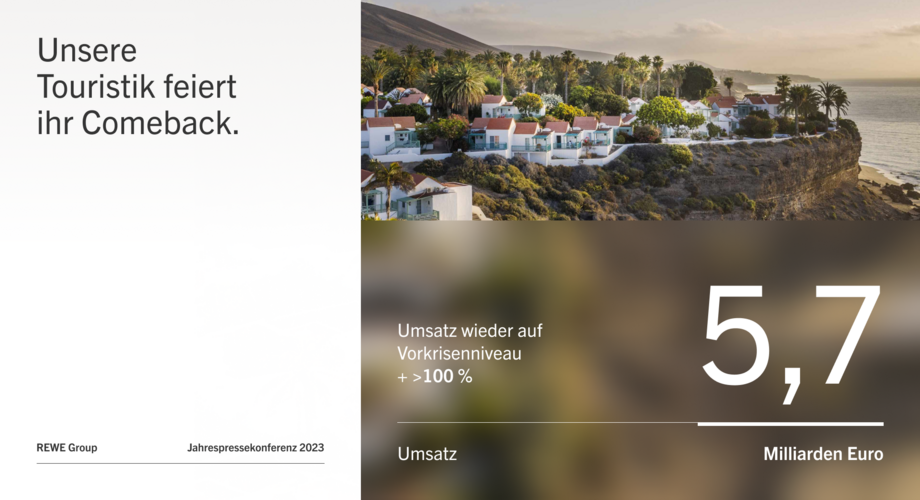 Gleichzeitig wurde die Investitionstätigkeit trotz Krise weiter verstärkt: Die Investitionen in Sachanlagen und immaterielle Vermögenswerte stiegen um rund 520 Millionen Euro von 2,3 Milliarden Euro auf 2,8 Milliarden Euro.
Gleichzeitig wurde die Investitionstätigkeit trotz Krise weiter verstärkt: Die Investitionen in Sachanlagen und immaterielle Vermögenswerte stiegen um rund 520 Millionen Euro von 2,3 Milliarden Euro auf 2,8 Milliarden Euro.
Für das laufende Jahr sind Investitionen in Höhe von 2,7 Milliarden Euro geplant. Das Eigenkapital stieg um 8,5 Prozent von 8,6 Milliarden Euro auf 9,4 Milliarden Euro.
** English Version **
REWE Group ended the 2022 business year on a successful note and continues its stable performance. In view of the many different impacts of the Ukraine war, the consistent course and broad-based international structure (retail, travel and tourism, convenience) have once again paid off.
Total revenue rose – including for inflation-related reasons – to a high level, while the operating result (EBITA) was down slightly on the previous year’s level. The negative effects on the results – deliberately costed decline in food retail in Germany by investing in customer prices, cost increases from energy, raw materials, staff, logistics and risk provisions for selected equity investments – were offset by positive contributions from other parts of the group. This stable result was driven especially by the strong comeback of travel and tourism after the coronavirus pandemic, as well as an encouraging trend in the international business and at Lekkerland. REWE Group’s investments were not only continued in 2022, but intensified at a very high level.
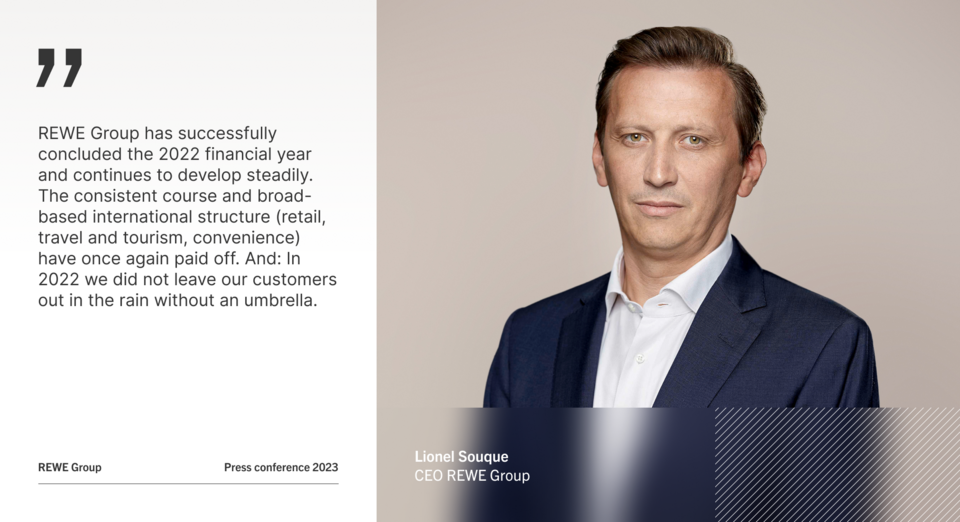
Food retail in Germany: three-digit million sum invested in costumer prices
“We did not leave our customers out in the rain without an umbrella in 2022”, says Lionel Souque, CEO of REWE Group, making good on his promise. “As announced, we invested a three-digit million sum in Germany alone, effectively and verifiably stabilising our customer prices and deliberately accepting a decline in the result in food retail in Germany and actively foregoing profit.” Calculated for 2022 as a whole, product range inflation – i.e. price increases on REWE’s shelves – was kept at 7.3 per cent at REWE, which for customers was noticeably lower than the consumer price index – CPI – for food of 13.4 per cent in 2022, explains Souque.
Cooperative principles rather than maximising shareholder value
“By investing in our customers in food retail, we took a conscious decision to forego profit. The strong comeback of travel and tourism and the good performance of other parts of the Group helped us offset the decline. We can do that because, as a cooperative, we are not driven by dividends, but aim to maintain sustainable business practices and generate long-term growth. We ultimately invest up to 99 per cent of what we earn in developing our business segments”, emphasizes Souque upon publication of the as yet unaudited financials of the company in Cologne. He added that this long-term focus also included, for example, the portfolio management strategy of REWE Group’s wholesale energy trading subsidiary EHA, which in response to skyrocketing energy prices had cushioned the resulting cost increases by almost 150 million euros in Germany in 2022. “And unlike other players, we did not scale back or discontinue our investments during the crisis. On the contrary, with a complete focus on what our customers want for the future – modernisation, digitalisation, innovation and greening – we even increased them across all business segments to a total volume of 2.8 billion euros.”
Solid financial strength secures continued successful organic growth
Overall, after three years of economic and socio-political extremes, the broadly based international group of companies was in a very solid financial position, explains the CEO of REWE Group: “Given our revenue, results, debt, equity and investment performance, we are in a position to continue in the overall direction we have taken and remain on a steady course from our own resources. We have the right game strategy, composition and team.” It was a fact, however, that even REWE Group can cushion inflation-driven developments – by investing in customer prices – only for a limited time. “Given the lower overall return on sales compared with other industries, we kept a very close eye on the continuing cost increases and our earnings power. We have to do so – not least out of a sense of responsibility to millions of customers across Europe, 384,000 employees, tens of thousands of partners and suppliers and our owners – to allow us to handle the investments in the medium and long term and to continue to develop the business on a sustainable financial basis”, explains Lionel Souque.
Customers trust REWE retailers in times of crisis: revenue up 6.4 per cent
The revenue generated by the REWE retailers under the umbrella of the cooperative REWE Group increased by 6.4 per cent to 15.9 billion euros. “The independent REWE retailers were able to score, even in a year that was economically very difficult for our customers; they are and will remain the drivers of success for REWE”, continues the CEO of REWE Group.
REWE Group revenue increases by 10.4 per cent
In the last business year, REWE Group’s revenue rose by 10.4 per cent, from 76.8 billion to 84.8 billion euros. The cooperative combine grew by 8.2 per cent to 58.6 billion euros (2021: 54.1 billion euros) in Germany and by 15.7 per cent (15.5 per cent adjusted for exchange rate effects) to 26.2 billion euros internationally. The number of employees rose by 1.4 per cent to 384,239. In Germany, the number increased slightly (+0.2%) to 280,839, while the group’s workforce expanded by 4.7 per cent internationally, to about 104,000.
REWE Group successfully navigates crisis year 2022
REWE Group’s revenue – excluding independent retail and equity-accounted entities – from continuing operations rose by 11.3 per cent from 69.4 billion euros to 77.2 billion euros in the year under review. Revenue in Germany increased by 8.7 per cent to 51.3 billion euros and internationally by 16.8 per cent (16.6 per cent adjusted for exchange rate effects) to 25.9 billion euros.
The operating result (EBITA) was down 2.3 per cent from 1.49 billion euros (2021) to 1.45 billion euros, while combined net profit fell by 33.4 per cent, from 755.6 million euros to 503.5 million euros.
The combined result of the international group was driven by two opposing trends. The deliberately accepted decline in the result in food retail in Germany (REWE, PENNY), cost increases from energy, raw materials, logistics and staff, as well as risk provisions for selected equity investments were offset by positive contributions from other parts of the combine; contributing factors were especially the positive trend in travel and tourism, complemented by good performance in the international business and at Lekkerland.
At the same time, the combine further boosted its investment activities despite the crisis: Investments in property and intangible assets rose by around 520 million euros from 2.3 billion euros to 2.8 billion euros.

